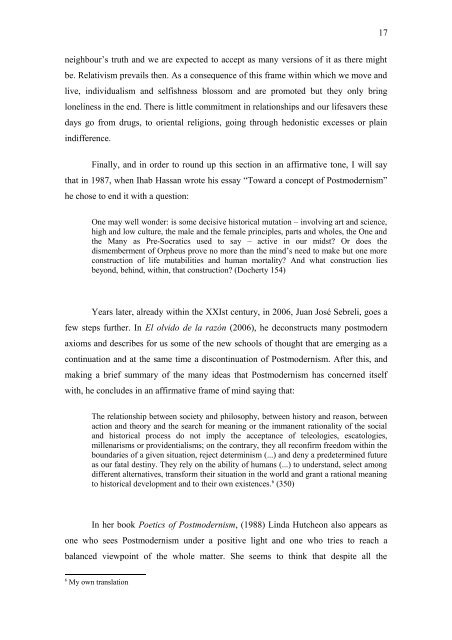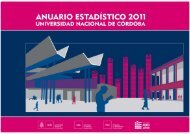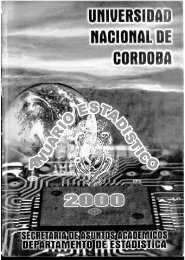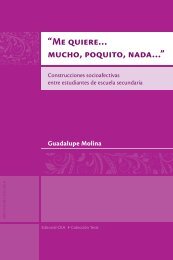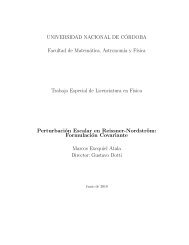Chapter I - RDU - Universidad Nacional de Córdoba
Chapter I - RDU - Universidad Nacional de Córdoba
Chapter I - RDU - Universidad Nacional de Córdoba
Create successful ePaper yourself
Turn your PDF publications into a flip-book with our unique Google optimized e-Paper software.
17neighbour’s truth and we are expected to accept as many versions of it as there mightbe. Relativism prevails then. As a consequence of this frame within which we move andlive, individualism and selfishness blossom and are promoted but they only bringloneliness in the end. There is little commitment in relationships and our lifesavers thesedays go from drugs, to oriental religions, going through hedonistic excesses or plainindifference.Finally, and in or<strong>de</strong>r to round up this section in an affirmative tone, I will saythat in 1987, when Ihab Hassan wrote his essay “Toward a concept of Postmo<strong>de</strong>rnism”he chose to end it with a question:One may well won<strong>de</strong>r: is some <strong>de</strong>cisive historical mutation – involving art and science,high and low culture, the male and the female principles, parts and wholes, the One andthe Many as Pre-Socratics used to say – active in our midst? Or does thedismemberment of Orpheus prove no more than the mind’s need to make but one moreconstruction of life mutabilities and human mortality? And what construction liesbeyond, behind, within, that construction? (Docherty 154)Years later, already within the XXIst century, in 2006, Juan José Sebreli, goes afew steps further. In El olvido <strong>de</strong> la razón (2006), he <strong>de</strong>constructs many postmo<strong>de</strong>rnaxioms and <strong>de</strong>scribes for us some of the new schools of thought that are emerging as acontinuation and at the same time a discontinuation of Postmo<strong>de</strong>rnism. After this, andmaking a brief summary of the many i<strong>de</strong>as that Postmo<strong>de</strong>rnism has concerned itselfwith, he conclu<strong>de</strong>s in an affirmative frame of mind saying that:The relationship between society and philosophy, between history and reason, betweenaction and theory and the search for meaning or the immanent rationality of the socialand historical process do not imply the acceptance of teleologies, escatologies,millenarisms or provi<strong>de</strong>ntialisms; on the contrary, they all reconfirm freedom within theboundaries of a given situation, reject <strong>de</strong>terminism (...) and <strong>de</strong>ny a pre<strong>de</strong>termined futureas our fatal <strong>de</strong>stiny. They rely on the ability of humans (...) to un<strong>de</strong>rstand, select amongdifferent alternatives, transform their situation in the world and grant a rational meaningto historical <strong>de</strong>velopment and to their own existences. 6 (350)In her book Poetics of Postmo<strong>de</strong>rnism, (1988) Linda Hutcheon also appears asone who sees Postmo<strong>de</strong>rnism un<strong>de</strong>r a positive light and one who tries to reach abalanced viewpoint of the whole matter. She seems to think that <strong>de</strong>spite all the6My own translation


